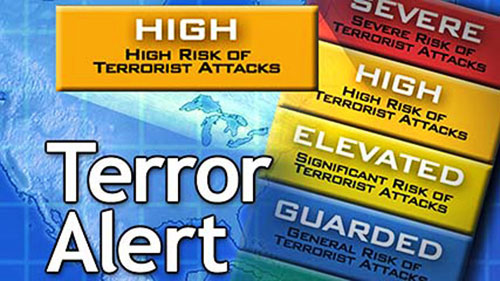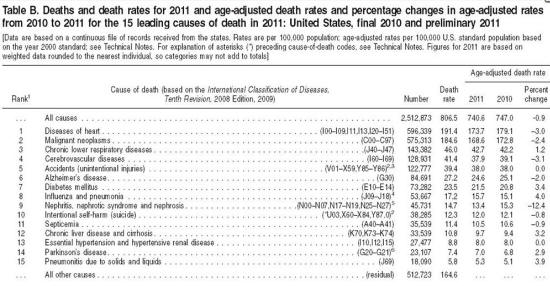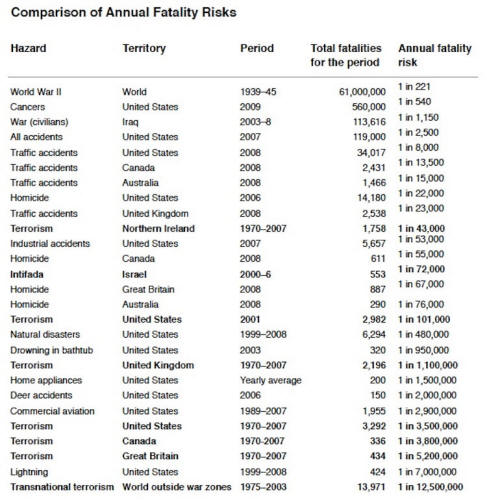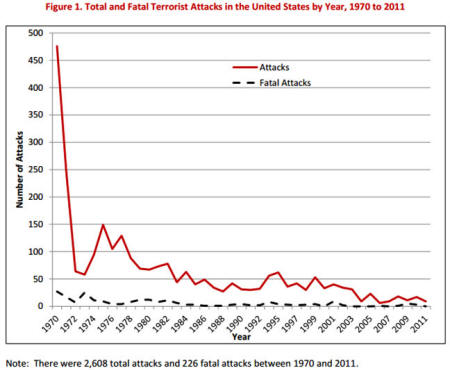|
by WashingtonsBlog
from
WashingtonsBlog Website
By Deer, Cows, Dogs, Brain-Eating Parasites, Toddlers, Lightning, Falling Out of Bed, Alcoholism, Food Poisoning, Choking On Your Meal, a Financial Crash, Obesity, Medical Errors or "Autoerotic Asphyxiation" than by Terrorists...
Preface
The terror threat is greatly exaggerated. After all, the type of counter-terror experts who frequently appear on the mainstream news are motivated to hype the terror threat, because it drums up business for them.
The same is true for government employees.
As former FBI assistant director Thomas Fuentes put it earlier this year:
Fearmongering also serves political goals.
For example, FBI agents and CIA intelligence officials, a top constitutional and military law expert, Time magazine, the Washington Post and others have all said that U.S. government officials "were trying to create an atmosphere of fear in which the American people would give them more power".
Indeed, the former Secretary of Homeland Security Tom Ridge admitted that he was pressured to raise terror alerts to help Bush win reelection.
Former U.S. National Security Adviser
Zbigniew Brzezinski - also a top foreign policy advisor to President
Obama - told the Senate that the war on terror is a "a mythical historical narrative". The government justifies its geopolitical goals - including seizing more power at home, and overthrowing oil-rich countries - by hyping the terror menace. So the government wants you to be scared out of your pants by the risk of terrorism.
Even though there have been a spate of terror attacks in Paris, California, London and elsewhere recently, the levels of terrorism are still much lower than many assume.
Government officials and counter-terror experts may hype the terror threat to promote their agendas. But - as shown below - your risk of being killed in a terror attack is actually much lower than being killed by virtually any other cause.
Daniel Benjamin - the Coordinator for Counterterrorism at the United States Department of State from 2009 to 2012 - noted in January (at 10:22):
Time Magazine noted in 2013 that the chance of dying in a terrorist attack in the United States from 2007 to 2011, according to Richard Barrett - coordinator of the United Nations al Qaeda/Taliban Monitoring Team - was 1 in 20 million.
Let's look at specific numbers…
The U.S. Department of State reports that only 17 U.S. citizens were killed worldwide as a result of terrorism in 2011.* That figure includes deaths in Afghanistan, Iraq and all other theaters of war.
* Note: Subsequent official reports - published in 2012 and 2013 - show that even fewer Americans were killed by terrorists than in the previous year.
In contrast, the American agency which tracks health-related issues - the U.S. Centers for Disease Control - rounds up the most prevalent causes of death in the United States:
Comparing the CDC numbers to terrorism deaths means:
(Keep in mind when reading this entire piece that we are consistently and substantially understating the risk of other causes of death as compared to terrorism, because we are comparing deaths from various causes within the United States against deaths from terrorism worldwide.)
Wikipedia notes that obesity is a a contributing factor in 100,000-400,000 deaths in the United States per year. That makes obesity 5,882 to 23,528 times more likely to kill you than a terrorist.
The annual number of deaths in the U.S. due to avoidable medical errors is as high as 100,000. Indeed, one of the world's leading medical journals - Lancet - reported in 2011:
That's just Medicare beneficiaries, not the entire American public. Scientific American noted in 2009:
And a new study in the Journal of Patient Safety says the numbers may be up to 440,000 each year.
But let's use the lower - 100,000 - figure. That still means that you are 5,882 times more likely to die from medical error than terrorism.
The CDC says that some 80,000 deaths each year are attributable to excessive alcohol use. So you're 4,706 times more likely to drink yourself to death than die from terrorism.
Approximately 38,329 Americans die each year from drug overdoses. That's 2,255 times more than from terrorists.
Wikipedia notes that there were 32,367 automobile accidents in 2011, which means that you are 1,904 times more likely to die from a car accident than from a terrorist attack.
The Washington Post reports:
Even President Obama agreed.
According to a 2011 CDC report, poisoning from prescription drugs is even more likely to kill you than a car crash. Indeed, the CDC stated in 2011 that - in the majority of states - your prescription meds are more likely to kill you than any other source of injury.
So your meds are thousands of times more likely to kill you than Al Qaeda.
The financial crisis has also caused quite a few early deaths. The Guardian reported in 2008:
Since there were 596,339 deaths from heart disease in the U.S. in 2011 (see CDC table above), that means that there are approximately 38, 165 additional deaths a year from the financial crisis… and Americans are 2,245 times more likely to die from a financial crisis that a terrorist attack.
Financial crises cause deaths in other ways, as well. For example, the poverty rate has skyrocketed in the U.S. since the 2008 crash.
For example, the poverty rate in 2010 was the highest in 17 years, and more Americans numerically were in poverty as of 2011 than for more than 50 years. Poverty causes increased deaths from hunger, inability to pay for heat and shelter, and other causes.
(And - as mentioned below - suicides have skyrocketed recently; many connect the increase in suicides to the downturn in the economy.)
The number of deaths by suicide has also surpassed car crashes. Around 35,000 Americans kill themselves each year (and more American soldiers die by suicide than combat; the number of veterans committing suicide is astronomical and under-reported).
So you're 2,059 times more likely to kill yourself than die at the hand of a terrorist.
The CDC notes that there were 7,638 deaths from HIV and 45 from syphilis, so you're 452 times more likely to die from risky sexual behavior than terrorism. (That doesn't include death by autoerotic asphyxiation… discussed below.)
Americans are some 428 times more likely to die from gun violence than terrorism.
The National Safety Council reports that more than 6,000 Americans die a year from falls… most of them involve people falling off their roof or ladder trying to clean their gutters, put up Christmas lights and the like. That means that you're 353 times more likely to fall to your death doing something idiotic than die in a terrorist attack.
The same number - 6,000 - die annually from texting or talking on the cellphone while driving. So you're 353 times more likely to meet your maker while lol'ing than by terrorism.
Some 5,000 Americans die each year from eating contaminated food. That's 294 times more than from terrorism. And see this.
The agency in charge of workplace safety - the U.S. Occupational Safety and Health Administration - reports that 4,609 workers were killed on the job in 2011 within the U.S. homeland. In other words, you are 271 times more likely to die from a workplace accident than terrorism.
Approximately 4,000 Americans drown each year… 235 times more than from terror attacks.
The CDC notes that 3,177 people died of "nutritional deficiencies" in 2011, which means you are 187 times more likely to starve to death in American than be killed by terrorism.
Americans' risk of death from post-surgical complications is around 117,519 to 1. That's 170 times more than from terrorism.
About 2,200 Americans die each year from acute alcohol poisoning (i.e. extreme binge drinking)… 129 times more than from terror attacks.
Americans' risk of death from falling down stairs is approximately 157,300 to 1. That's 127 times more than from terrorism.
Some 2,000 Americans die each year from heat or cold. That's 118 times more than from terrorism.
Approximately 1,000 Americans die each year from autoerotic asphyxiation. So you're 59 times more likely to kill yourself doing weird, kinky things than at the hands of a terrorist.
Americans' risk of death from cycling accidents is 340,845 to 1. That's 59 times more than from terrorism.
There were an average of 928 Americans killed by police officers in the United States each year in "justifiable homicides". That means that you were more than 55 times more likely to be killed by a law enforcement officer than by a terrorist. That number does not include unjustifiable homicides.
Some 411 Americans are electrocuted each year… 24 times more than die from terrorism.
Nearly 400 Americans die each year due to allergic reactions to penicillin. More than 200 deaths occur each year due to food allergies. Nearly 100 Americans die due to insect allergies. And 10 deaths each year are due to severe reactions to latex. See this.
There are many other types of allergies, but that totals 710 deaths each year from just those four types of allergies alone… making it 42 times more likely that you'll die from an allergic reaction than from a terror attack.
Some 450 Americans die each year when they fall out of bed, 26 times more than are killed by terrorists.
Scientific American notes:
Toxoplasmosis is a brain-parasite.
The CDC reports that more than 375 Americans die annually due to toxoplasmosis. In addition, 3 Americans died in 2011 after being exposed to a brain-eating amoeba. So you're about 22 times more likely to die from a brain-eating zombie parasite than a terrorist.
200 Americans are killed each year when they hit deer… 12 times more than from terrorism.
100 Americans die a year due to scalding hot tap water, 6 times more than due to terrorists.
58 Americans are killed each year by bees, wasps and hornets… 3 times more than by terrorism.
Some 34 Americans a year are killed by dogs… around twice as many as by terrorists.
20 Americans are killed each year by cows… more than by terrorists.
The Jewish Daily Forward noted in May that - even including the people killed in the Boston bombing - you are more likely to be killed by a toddler than a terrorist. And see these statistics from CNN.
The 2011 Report on Terrorism from the National Counter Terrorism Center notes that Americans are just as likely to be "crushed to death by their televisions or furniture each year" as they are to be killed by terrorists.
And the Senior Research Scientist for the Space Science Institute (Alan W. Harris) estimates that the odds of being killed by a terrorist attack is about the same as being hit by an asteroid (and see this).
The odds are that being left-handed (in a world where equipment is built for right-handers) is also a lot more likely to kill you than terrorism.
Reason notes:
Scientific American reported in 2011:
Terrorism pushes our emotional buttons.
And politicians and the media tend to blow the risk of terrorism out of proportion. But as the figures above show, terrorism is a very unlikely cause of death.
Our spending on anti-terrorism measures is way out of whack… especially because most of the money has been wasted. And see this article, and this 3-minute video by professor Mueller:
Indeed, mission creep in the name of countering terrorism actually makes us more vulnerable to actual terrorist attacks. And corrupt government policy is arguably more dangerous than terrorism.
Sadly, the terrorism deaths Americans have suffered were unnecessary… and were largely due to corruption in our security agencies. And see this. Even so - and even counting the recent Islamic terror attacks - there are far fewer terror attacks than there used to be.
As the Washington Post noted in 2013 that the number of terror attacks in the U.S. has plummeted since the 1970s:
|





